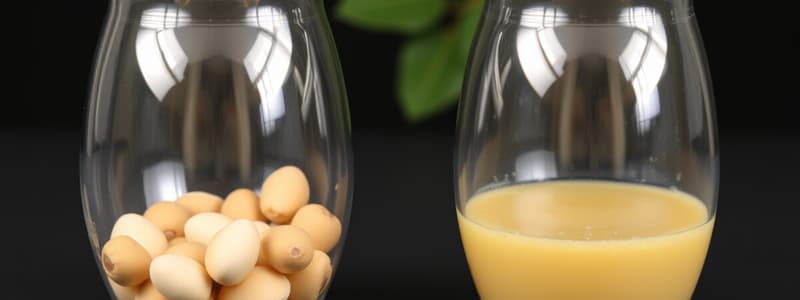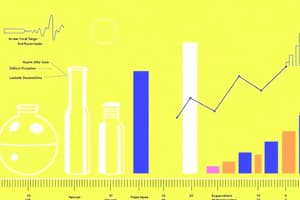Podcast
Questions and Answers
The time between the pretest and the posttest is very short, then the ______
The time between the pretest and the posttest is very short, then the ______
maturation effect is less likely to occur
What is the difference between randomization and random sampling?
What is the difference between randomization and random sampling?
Randomization means randomly assigning people into two or more groups, random sampling meaning choosing a sample from a population in a random way.
The classical experimental design contains all EXCEPT which of the following?
The classical experimental design contains all EXCEPT which of the following?
- Control group
- Posttest
- At least one independent variable
- At least two different independent variables (correct)
What kind of design is being used when new parents take a poison knowledge test after attending a training session?
What kind of design is being used when new parents take a poison knowledge test after attending a training session?
Which of the following is LEAST suited to providing clear evidence about a causal relationship between two variables?
Which of the following is LEAST suited to providing clear evidence about a causal relationship between two variables?
The Solomon four-group design combines which two other designs?
The Solomon four-group design combines which two other designs?
What are the seven parts of an experiment?
What are the seven parts of an experiment?
What experimental design did Henrietta use for a radio commercial?
What experimental design did Henrietta use for a radio commercial?
What problem with internal validity might threaten Timothy's ability to trust his experimental results?
What problem with internal validity might threaten Timothy's ability to trust his experimental results?
In what part of the experiment does George measure the level of his dependent variable after introducing the independent variable?
In what part of the experiment does George measure the level of his dependent variable after introducing the independent variable?
What does the use of small favors illustrate in a field observation?
What does the use of small favors illustrate in a field observation?
Why are interviews important in field research?
Why are interviews important in field research?
Field research is usually conducted by a researcher alone or in a small team.
Field research is usually conducted by a researcher alone or in a small team.
Why do researchers use unstructured or intensive interviews in field research?
Why do researchers use unstructured or intensive interviews in field research?
What is involved in Step 2 of conducting a field research study?
What is involved in Step 2 of conducting a field research study?
What does Step 3 in conducting a field research study entail?
What does Step 3 in conducting a field research study entail?
What is included in Step 4 of conducting a field research study?
What is included in Step 4 of conducting a field research study?
What are similarities to field research?
What are similarities to field research?
How does one acquire foundation knowledge for research?
How does one acquire foundation knowledge for research?
What are primary sources?
What are primary sources?
What are secondary sources?
What are secondary sources?
What are running records?
What are running records?
What are recollections in research?
What are recollections in research?
What is random assignment?
What is random assignment?
What does a within-participants experiment involve?
What does a within-participants experiment involve?
What does within-groups comparison mean?
What does within-groups comparison mean?
What is the difference between between-groups comparison?
What is the difference between between-groups comparison?
Which components are part of the experiment?
Which components are part of the experiment?
What is the treatment or independent variable?
What is the treatment or independent variable?
What is the dependent variable (outcome)?
What is the dependent variable (outcome)?
What does the pretest measure?
What does the pretest measure?
What does the posttest measure?
What does the posttest measure?
What is the experimental group?
What is the experimental group?
What is the control group?
What is the control group?
What are the steps in conducting an experiment?
What are the steps in conducting an experiment?
What is a one-shot case study design?
What is a one-shot case study design?
What is a one-group pretest-posttest design?
What is a one-group pretest-posttest design?
What does the static group comparison design involve?
What does the static group comparison design involve?
What is the Solomon four-group design?
What is the Solomon four-group design?
What are the four groups in experimental design?
What are the four groups in experimental design?
What is selection bias?
What is selection bias?
What is history in terms of internal validity?
What is history in terms of internal validity?
What does maturation refer to in experimentation?
What does maturation refer to in experimentation?
What is testing in research contexts?
What is testing in research contexts?
What is the placebo effect?
What is the placebo effect?
What does instrumentation refer to?
What does instrumentation refer to?
What is experimental mortality?
What is experimental mortality?
What is diffusion of treatment?
What is diffusion of treatment?
What are demand characteristics?
What are demand characteristics?
Flashcards are hidden until you start studying
Study Notes
Experimental Designs
- Maturation effect is minimized when the time between pretest and posttest is short.
- Randomization involves assigning subjects to groups, while random sampling refers to selecting a sample from a population.
- Classical experimental design typically does not include multiple independent variables.
- The one-group pretest-posttest design measures participants before and after treatment without a control group.
- One-shot case studies provide the least evidence for causal relationships.
- The Solomon four-group design integrates classical experimental and two-group posttest designs.
Elements of Experiments
- Key components of an experiment include treatment, dependent variable, pretest, posttest, experimental group, control group, and random assignment.
- Within-participants experiments evaluate the same participant across different times or conditions, while between-groups experiments compare different groups experiencing varied treatments.
Data Collection in Field Research
- Field research can involve helping participants in their environments, termed the use of small favors.
- Building trust and rapport in field research often requires researchers to share personal backgrounds during interviews.
- Unstructured interviews aim for deep understanding of participant views and beliefs.
Steps in Conducting Field Research
- Select a site, manage access with gatekeepers, and establish social roles.
- Apply strategies like normalizing research and appearing interested to gather data effectively.
- Gather and record data through immersion in the environment, with attention to observation and documentation.
Understanding Sources and Knowledge
- Primary sources include first-hand materials like letters and photos, while secondary sources analyze these primary materials.
- Acquiring foundational knowledge involves studying relevant cultural contexts, history, and sometimes learning additional languages.
Key Validity Issues
- Selection bias threatens internal validity when comparing groups that may differ fundamentally in characteristics.
- History effects occur when external events influence dependent variables during an experiment.
- Maturation refers to natural developmental changes in participants over lengthy studies impacting results.
Measurement Challenges
- The testing effect may influence outcomes as responses to pretests can reshape responses in posttests.
- Placebo effects illustrate behavioral changes stemming from perceptions of treatment rather than treatments themselves.
- Instrumentation issues can arise when measurement tools or methods change over time.
Research Design Variations
- The static group comparison design lacks random assignment, comparing groups based solely on posttest results.
- Selection bias involves ensuring groups are comparable to obtain valid comparisons.
- Experimental mortality occurs when participants withdraw, which could lead to biased results.
Studying That Suits You
Use AI to generate personalized quizzes and flashcards to suit your learning preferences.




